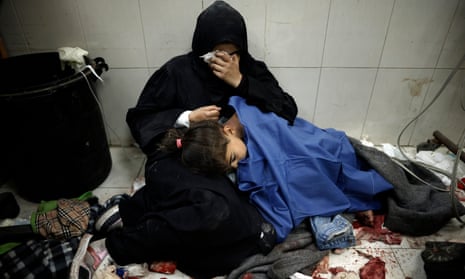Nasser hospital has been put ‘completely out of service’, says health ministry
The Gaza Strip’s second-largest hospital has been put “completely out of service”, a spokesperson for the Gaza health ministry said on Sunday.
“There are only four medical teams – 25 staff – currently caring for patients” inside the Nasser hospital in Khan Younis, Ashraf al-Qidra told Reuters.
“The Nasser medical complex is the backbone of healthcare in southern Gaza Strip. Its ceasing to function is a death sentence for hundreds of thousands of Palestinian displaced people in Khan Younis and Rafah,” he said.
Qidra said a lack of fuel and fighting around the facility – which was Gaza’s largest functioning hospital until Sunday – had put it out of action.
Key events
Israel’s prime minister, Benjamin Netanyahu, said his government would vote on a “declaratory decision” regarding Israel’s opposition to any unilateral imposition of Palestinian statehood, Reuters reports.
Netanyahu said at the start of the weekly cabinet meeting that the move comes after “recent talk in the international community about an attempt to unilaterally impose on Israel a Palestinian state”.
The formal statement, he said, would reflect that “Israel rejects outright international dictates regarding a permanent arrangement with the Palestinians. Such an arrangement can only be reached in direct negotiations between the sides, without preconditions.”
Britain, the US and other western countries have supported the idea of an independent Palestine existing alongside Israel, but have said Palestinian independence should come as part of a negotiated settlement.
Netanyahu has repeatedly rejected the creation of an independent Palestinian state after the war.
An Israeli airstrike in Rafah overnight reportedly killed six people, including a woman and three children, and another strike killed five people in Khan Younis.
Associated Press journalists saw the bodies arrive at a hospital in Rafah, where about 1.4 million displaced civilians are sheltering.
In Gaza City, an airstrike flattened a family home, killing seven people, including three women, according to Sayed al-Afifi, a relative of the deceased.
Death toll in Gaza reaches 28,985, says health ministry
A total of 28,985 Palestinians have been killed and 68,883 others injured in Israeli strikes on Gaza since 7 October 2023, the Gaza health ministry said in a statement on Sunday.
At least 127 Palestinians have been killed and 205 others injured in the past 24 hours, the ministry added.
Most of the casualties have been women and children, the ministry has said, and thousands more bodies are likely to remain uncounted under rubble across Gaza.
Russia has invited Palestinian factions to meet in Moscow on 26 February, the Palestinian Authority’s prime minister has said.
“Russia has invited all Palestinian factions who will be meeting on the 26 of this month in Moscow. We will see if Hamas is ready to come to the ground with us,” Mohammad Shtayyeh told the Munich security conference, according to Reuters.
“We are ready to engage. If Hamas is not then that’s a different story. We need Palestinian unity,” he said, adding that to be part of that unity Hamas needed to meet certain prerequisites.
The Palestinian Authority exercises limited governance in the occupied West Bank.
The UN’s highest court will open historic hearings on Monday into the legality of Israel’s occupation of Palestinian territories since 1967, news agencies report.
Six days of hearings are scheduled at the International Court of Justice (ICJ), with an unprecedented 52 countries expected to give evidence.
Countries including the US, Russia, and China will address judges in a week-long session at the Peace Palace in The Hague.
Against the backdrop of the current war, it will focus on Israel’s open-ended occupation of the West Bank, Gaza and east Jerusalem.
Palestinian representatives, who speak first on Monday, will argue that the Israeli occupation is illegal because it has violated three key tenets of international law, the Palestinian legal team has told reporters.
Israel is not scheduled to speak during the hearings, but could submit a written statement and will likely justify the ongoing occupation on security grounds, especially in the absence of a peace deal.
The court will likely take months to rule. But experts say the decision, though not legally binding, could profoundly impact international jurisprudence, international aid to Israel and public opinion.
Nasser hospital has been put ‘completely out of service’, says health ministry
The Gaza Strip’s second-largest hospital has been put “completely out of service”, a spokesperson for the Gaza health ministry said on Sunday.
“There are only four medical teams – 25 staff – currently caring for patients” inside the Nasser hospital in Khan Younis, Ashraf al-Qidra told Reuters.
“The Nasser medical complex is the backbone of healthcare in southern Gaza Strip. Its ceasing to function is a death sentence for hundreds of thousands of Palestinian displaced people in Khan Younis and Rafah,” he said.
Qidra said a lack of fuel and fighting around the facility – which was Gaza’s largest functioning hospital until Sunday – had put it out of action.
WHO chief: Nasser hospital in Gaza no longer ‘functional’
The head of the World Health Organization, Tedros Adhanom Ghebreyesus, said Nasser hospital in Khan Younis in Gaza is no longer functioning due to the Israeli army’s “week-long siege followed by the ongoing raid”.
In a post on X, he said there are about 200 patients in the hospital, of which at least 20 need to be urgently referred to receive care elsewhere.
“The cost of delays will be paid by patients’ lives. Access to the patients and hospital should be facilitated,” he wrote.
Nasser hospital in #Gaza is not functional anymore, after a weeklong siege followed by the ongoing raid.
Both yesterday and the day before, the @WHO team was not permitted to enter the hospital to assess the conditions of the patients and critical medical needs, despite…
— Tedros Adhanom Ghebreyesus (@DrTedros) February 18, 2024
Intense fighting raged last week around the Nasser hospital.
The Israel Defense Forces said troops entered the hospital on Thursday, acting on what it said was “credible intelligence” that hostages seized on 7 October had been held there.
The UN criticised the raid while medical staff reported on Thursday that the hospital was hit directly by tank fire. The power was cut and the generators stopped after the raid, leading to the deaths of six patients due to a lack of oxygen, according to the health ministry.
The Israeli military said on Sunday that it killed dozens of Palestinian militants and seized a large amount of weapons in fighting throughout the Gaza Strip over the past day.
Israel has been focusing its offensive in the southern Gaza city of Khan Younis, where the military said troops are being backed by tanks and air support.
“Over the past day, dozens of terrorists were eliminated and large quantities of weapons were seized,” the military said.
Israeli special forces were still operating in and around the Nasser hospital, the largest in southern Gaza, it said.
At least 120 patients and five medical teams were trapped without water, food and electricity in the Nasser hospital in the southern city of Khan Younis, according to the health ministry in Gaza.
US likely to veto UN vote calling for ceasefire
The UN security council is likely to vote on Tuesday on an Algerian push to demand an immediate humanitarian ceasefire in Israel’s war in Gaza, diplomats told Reuters.
Algeria put forward an initial draft resolution more than two weeks ago. But the US ambassador to the UN, Linda Thomas-Greenfield, quickly said the text could jeopardise negotiations aimed at brokering a pause in the war.
“The United States does not support action on this draft resolution. Should it come up for a vote as drafted, it will not be adopted,” Thomas-Greenfield said in a statement on Saturday.
Algeria requested on Saturday that the council vote on Tuesday, diplomats said.
Washington traditionally shields its ally Israel from UN action and has already twice vetoed council action since the 7 October Hamas attack.
But it has also abstained twice, allowing the council to adopt resolutions that aimed to boost humanitarian aid to Gaza and called for urgent and extended humanitarian pauses in fighting.
Talks between the US, Egypt, Israel and Qatar are on to seek a pause in the war and the release of hostages held by Hamas.
“It is critical that other parties give this process the best odds of succeeding, rather than push measures that put it – and the opportunity for an enduring resolution of hostilities – in jeopardy,” Thomas-Greenfield said.
Opening summary
We are restarting our live coverage of Israel’s war in Gaza and the wider Middle East crisis.
The UN security council is likely to vote on Tuesday on whether to demand an immediate humanitarian ceasefire in Israel’s war in Gaza, diplomats told Reuters, in a move the US signalled it would veto.
Algeria put forward an initial draft resolution to the 15-member body more than two weeks ago. To be adopted, a UN security council resolution needs at least nine votes in favour and no vetoes by the United States, Britain, France, China or Russia.
But the US ambassador to the UN, Linda Thomas-Greenfield, quickly said the text could jeopardise “sensitive negotiations” aimed at brokering a pause in the war.
“The United States does not support action on this draft resolution. Should it come up for a vote as drafted, it will not be adopted,” Thomas-Greenfield said in a statement on Saturday.
More on that story shortly. In other key developments:
-
Israeli prime minister Benjamin Netanyahu on Saturday insisted Israeli forces would press ahead wth the Rafah offensive, saying those who were critical of it were effectively telling the country to “lose the war” against Hamas. He also indicated that troops would go in regardless of whether a hostage release is agreed. “Even if we achieve it, we will enter Rafah,” he told a televised news conference.
-
G7 foreign ministers on Saturday said they were worried by the risk of forcible displacement of Palestinian civilians out of Gaza and the possible consequences of an Israeli military operation in the Rafah region.
-
There is an “extraordinary opportunity” in the months ahead for Israel to be integrated into the Middle East as Arab countries are willing to normalise ties with the country, US secretary of state Antony Blinken said on Saturday. Speaking at a panel at the Munich Security Conference, Blinken also highlighted the “urgent” imperative to proceed with a Palestinian state that would also ensure the security of Israel.
-
German chancellor Olaf Scholz said Germany was asking Israel to abide by international law in the conflict in Gaza and not to open a second front on its northern border with Lebanon. Speaking at the Munich conference on Saturday, Scholz also said it should be made impossible for Iran to exploit the conflict to expand its influence and urged the need for humanitarian aid to get to Gaza.
-
Mediator Qatar acknowledged on Saturday that prospects for a new pause in Israel’s war in Gaza were “not really promising”. Qatari prime minister Mohammed bin Abdulrahman Al-Thani, who met with negotiators from both Israel and Hamas this week, said in Munich that efforts for a ceasefire had been complicated by the insistence of “a lot of countries” that any new truce involve further releases of hostages.
-
Head of the Hamas administration in the Gaza Strip, Ismail Haniyeh, blamed Israel for a lack of progress in achieving a ceasefire deal in Gaza in a statement issued on Saturday. Haniyeh added that Hamas “will not accept anything less than a complete cessation of the aggression, withdrawal of the occupation army from Gaza, and lifting of the unjust siege”. He also insisted that Israel must free Palestinian prisoners serving long sentences in any upcoming swap deal.
-
The US president, Joe Biden, said he doesn’t expect an offensive on the densely populated Rafah region of Gaza. Speaking at a press conference held after the announcement by Moscow of the death of dissident Alexei Navalny, Biden said a “temporary ceasefire” was necessary to evacuate hostages held in Gaza.
-
The US is preparing to send bombs and other weapons to Israel even as the US pushes for a ceasefire in the war on Gaza, reports The Wall Street Journal (WSJ). Citing current and former US officials, the US news publication said the proposed arms delivery is estimated to be worth tens of millions of dollars.
-
Iran unveiled two new air defence systems on Saturday, state media reported. The Arman missile system “can identify targets at 180 kilometres and engage and destroy them at 120 kilometres,” defence minister Mohammad-Reza Ashtiani said, while the new Azarakhsh defence system can be mounted on multiple vehicle types and “uses radar, electro-optical system and thermal seekers to detect and track its target”.
-
Israel is waging a concerted campaign aimed at destroying UNRWA, Philippe Lazzarini, the head of the UN agency for Palestinian refugees, said in an interview published on Saturday. Calls for his resignation were also part of the Israeli government’s push, he told the Swiss newspaper group Tamedia.
-
Israeli forces have arrested 100 people at Gaza’s largest functioning hospital amid mounting fears for patients and staff trapped inside the Nasser hospital in Gaza’s main southern city of Khan Younis. The IDF said on Saturday that it was continuing to conduct “a precise and limited operation against the Hamas terrorist organisation within the Nasser hospital”.
-
At least 120 patients and five medical teams are stuck without water, food and electricity in the Nasser hospital, according to the Gaza health ministry.
-
At least 28,858 Palestinians have been killed and 68,667 injured in Gaza since the 7 October, according to the Gaza health ministry.
-
Egypt has begun building an enclosed area ringed with high concrete walls along its border with Gaza that appears intended to house Palestinians fleeing a threatened Israeli assault on the southern city of Rafah. Photos and videos released by the Sinai Foundation for Human Rights (SFHR), a monitoring group, show workers using heavy machinery erecting concrete barriers and security towers around a strip of land on the Egyptian side of the Rafah crossing.
-
US Central Command (Centcom) said on Saturday that four anti-ship ballistic missiles were launched on Friday from Iranian-backed Houthi-controlled areas of Yemen into the Red Sea. At least three of the missiles were launched towards oil tanker Pollux, a Panamanian-flagged and Denmark-owned vessel, said Centcom. Earlier on Saturday, Yemen’s Iran-aligned Houthis said that they had fired missiles at oil tanker Pollux.




